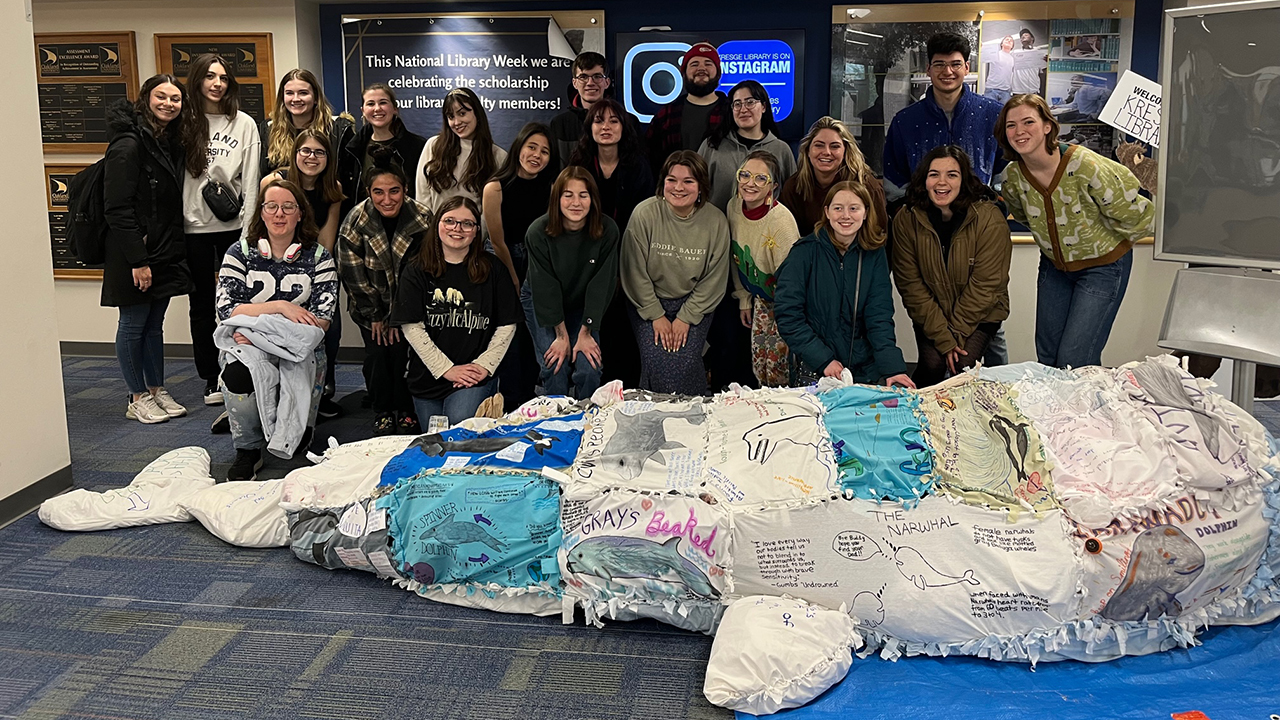The whale residing in Oakland University’s Kresge Library is the brain child of students in English Professor Jeffrey Insko’s Literature and the Environment class.
The nearly 15-foot-long piece of eco-art was created by students to call attention to ecological concerns, especially the damaging effects of human activity on the environment. The project is named “Ishwhale,” a nod to the classic novel “Moby-Dick,” whose narrator Ishmael relates the tale of Captain Ahab’s relentless pursuit of an elusive sperm whale.
Professor Insko found the project gratifying because it brought students together, cultivating a spirit of camaraderie for a worthy cause.
“What I love most about the project is that it was a collaborative effort,” said Insko. “A chance for students to work together, share ideas, share their enthusiasm, and most importantly, foster community.”
The outside of “Ishwhale” is adorned with quotes from class readings, as well as facts about various species of cetacean, aquatic mammals that include whales, dolphins and porpoises. Each student researched a cetacean species and decorated a panel with art and writing. The panels were stitched together to create “Ishwhale,” currently on display near the main entrance of Kresge Library.
The class covered a broad range of materials, including articles, books, and videos about humanity's relationship to cetaceans. Many of the panels draw inspiration from the book “Undrowned: Black Feminist Lessons from Marine Mammals” by Alexis Pauline Gumbs.
“I loved the book so much that I included three quotes from her,” said Madison Waelchli, a double major in English and International Relations. “I also decided to tie in some current relevant environmental news in my panel. For example, I discussed the Willow Project, which will directly affect bowhead whales.”
Students filled the inside of “Ishwhale” with garbage, particularly plastic products, to underscore the massive amount of waste humans contribute to the environment.
“I hope people see it and are amazed at the size of the project, but even more shocked by the amount of trash,” said Myth Parks, who graduated this spring with a degree in creative writing. “Maybe it will make people think twice next time they use a plastic water bottle instead of a reusable one, or throw away plastic bags instead of using reusable grocery bags.”
For Ethan Berent, the project offered perspective on humanity’s place within and responsibilities toward the natural world.
“Whales are big. They decenter us and evoke a sublime sensation,” said Berent, who graduated with a degree in English. “‘Ishwhale’ is by no means anywhere near the size of the sperm whale it is modeled after, but is not small either. Even though many people may never see one in the wild, the fact that whales and humankind affect each other reigns true. Our unavoidable connection merits an increase in the collective duty to try not only to protect these animals, but reassess our relationship with the rest of the natural world at the most fundamental level.”
The students carried “Ishwhale” to Kresge library in late April, where he will remain until he migrates to the Oakland Center for the fourth annual Michigan Climate Summit on June 2. The Climate Summit is open to the public. For more information, and to register, visit the Michigan Climate Action Network’s summit page.


 May 08, 2023
May 08, 2023







